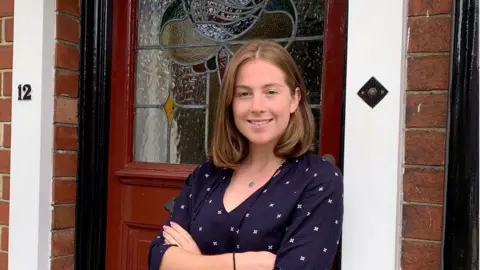First-time buyers: Four ways the property market 'will be tougher'
 Getty Images
Getty ImagesOfficial forecasts predict a fall in UK house prices with the economy in recession and jobs being lost.
First-time buyers may be rejoicing about the prospect of cheaper property.
Yet a report by the Resolution Foundation suggests home ownership could become increasingly "out of reach" for this group of people.
It comes as a survey of agents predicts a medium-term downturn in the housing market, following a short-lived boom after lockdown.
Will house prices fall?
The coronavirus crisis has led to people losing their jobs, incomes being hit, and the economy slumping.
Reopening the housing market and government support has led to a short-term rise in house prices and demand for property.
This will not last, commentators say, and over the coming months, house prices will inevitably fall on average, according to the government's official forecaster, the Office for Budget Responsibility.
It has predicted falls of anything between 2% this year, to 22% by the later half of next year.
Its central forecast is an 11% fall by the end of 2021 and flatlining thereafter.
Good or bad news for first-time buyers?
Usually, first-time buyers would see house price falls as a chance for property to become more affordable.
Some young people in stable jobs, with savings, and who have had the chance to put more aside in lockdown will benefit, the Resolution Foundation's Housing Outlook report says.
Yet, the typical first-time buyer faces four major obstacles, it suggests:
- Lenders will be asking for a larger deposit. The typical first-time buyer family, aged around 30 and putting aside 5% of their income, will need to save for more than 20 years to pay for it. A long-term financial downturn would mean mortgage lenders will need to protect themselves against borrowers being unable to repay, so would require a larger deposit upfront
- Saving has just got tougher. More than half of renters aged between 25 and 34 do not have savings. Others have either had to cut or dip into savings during lockdown owing, in part, to lower incomes
- The government's stamp duty holiday in England and Northern Ireland does not help. Before the current stamp duty holiday, many first-time buyers did not buy a home expensive enough to be charged stamp duty. They may also have had some advantage over movers, as the starting point was more favourable to first-time buyers. That advantage has disappeared for the time-being
- Moving for a job may be expensive. With jobs being lost, young workers may find they need to relocate. Extra travel could hit savings, while moving to a city for work is likely to mean higher housing costs
"Although prices are projected to fall - perhaps dramatically - in the wake of the pandemic-induced recession, this drop won't make things any easier for typical young first-time buyers looking to purchase their first home," said the report's co-author Lindsay Judge.
"The current crisis looks set to deepen pre-existing inequalities and the growing divide between those who are able to look forward to home ownership, and those for whom this dream is increasingly out of reach."
Boom and bust?
The Resolution Foundation has called for targeted government support for first-time buyers to support their incomes, or give them some kind of advantage over homeowners and landlords when trying to buy a property.
A separate survey of agents by the Royal Institution of Chartered Surveyors (RICS) said that July saw a rise in housing demand and sales across he UK, helped by the stamp duty holiday.
There has also been greater demand from tenants.
However, some surveyors say as government support for workers is withdrawn, then the trend could reverse.
"Significantly, some contributors are now even referencing the possibility of a boom followed by a bust," said Simon Rubinsohn, chief economist at Rics.


"I can't increase my offer any more without help from Mum and Dad."
Cordelia Clark's first home felt within reach. The 27-year-old was about to scramble on to the housing ladder, but then a twist appeared.
One of the UK's biggest mortgage lenders, Nationwide, altered the rules.
There is now a tighter limit on how much your family can help you when you are getting your deposit together. The bank of mum and dad - as it is often known.
